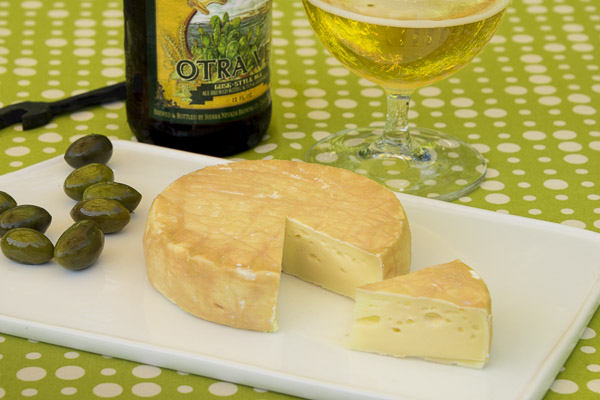Many cheesemakers and brewers know that their products are better together. But lately some American artisan cheesemakers are taking the relationship further. By washing their cheese with local brews, they’re producing some unique one-off wheels that deserve a permanent place in the firmament. Jasper Hill’s Gose-Washed Willoughby (pictured above), part of a new beer-themed series from this Vermont creamery, proves how rewarding the collaboration can be.
It was bound to happen. Both cheesemakers and brewers are creative types with “what if” mentalities. They’re fermentation geeks who like to hang out together, and they appreciate each other’s craft.
Jasper Hill cheesemaker Mateo Kehler initially tried washing Winnimere, his raw-milk bark-wrapped Vacherin-style cheese, with a beer spontaneously fermented on the premises. That didn’t fly. The beer was so acidic that it impeded the growth of desirable bacteria on the rind.
Willoughby, made with pasteurized cow’s milk, proved more amenable. “The beer has more of a chance of contributing positive aromas and being noticeable,” says Zoe Brickley, head of sales and marketing for Jasper Hill.
Understandably, the creamery doesn’t want to reveal too many details, but this much I know: the gose comes from Vermont’s Lost Nation Brewing and it’s applied without dilution. Gose, an uncommon style, comes from the German brewing tradition. It’s a pale, low-alcohol wheat beer flavored with coriander and fermented with lactic bacteria, which gives it a lemony sourness.
The washing begins early, with part brine and part beer. Cheesemaker Adam Smith allowed that he uses “specialized top-secret brushes” and stops washing “at a top-secret moment” to permit some white mold to bloom before the wheels are packaged. The eight-ounce disks are released at five to six weeks and peak two to three weeks later.
When I tasted the Gose-Washed Willoughby, I did not have a plain version to compare it to. Brickley says the beer makes a subtle but noticeable difference. “We like what it lends,” she told me. “It emphasizes the yeastiness of the cheese and seems to help the rind stay thin and balanced.”
But can you taste the beer? Honestly, I could not. Even so, the cheese was sublime, with a penetrating aroma, like a cow barn on a hot summer day. The flesh-colored surface was thin and tacky, with a saline crunch. The interior, the color of butter, was uniformly supple and silky, with the open appearance of a Saint-Nectaire but a lighter, non-fudgy texture. Looking back at my old tasting notes on plain Willoughby, I don’t find much difference. I loved that cheese, too.
Of course I opened a gose—Sierra Nevada’s Otra Vez—to accompany the cheese, but I didn’t think it was the ideal match. Its lemony tartness would be better, I think, with a fresh goat cheese or marinated feta. With the washed Willoughby, I’d prefer a saison or a Belgian-style strong golden ale like Duvel.
Look for Gose-Washed Willoughby at these retailers but don't delay. This fall, another beer-washed Willoughby will replace it.
San Francisco:
Andronico’s
Bi-Rite
Cheese Plus
Haight Street Market
Noriega Produce
Rainbow Grocery
Raxakoul Wine & Cheese
Say Cheese
Other Bay Area:
Big John’s Market (Healdsburg)
Brown’s Valley Market (Napa)
Dry Creek General Store (Healdsburg)
Market Hall Foods (Berkeley and Oakland)
Oxbow Cheese Merchant (Napa)
Oliver’s Market (multiple locations)
Sigona's (Redwood City and Palo Alto)
V. Sattui (St. Helena)
Woodland’s Market (Kentfield)
Other California:
Andrew’s Cheese Shop (Santa Monica)
Artisan Cheese Gallery (Studio City)
DTLA Cheese (Los Angeles)
Jerome’s Carmel Valley Market
Milkfarm (Los Angeles)
Sacramento Natural Foods Co-op
Say Cheese (Los Angeles)
Star Market (Salinas)
Vagabond Cheese (Los Angeles)
Wheel House Cheese Shop (Los Angeles)
Beyond California:
Gourmet Cellar (Livingston, MT)
Liberty Heights Fresh (Salt Lake City)


